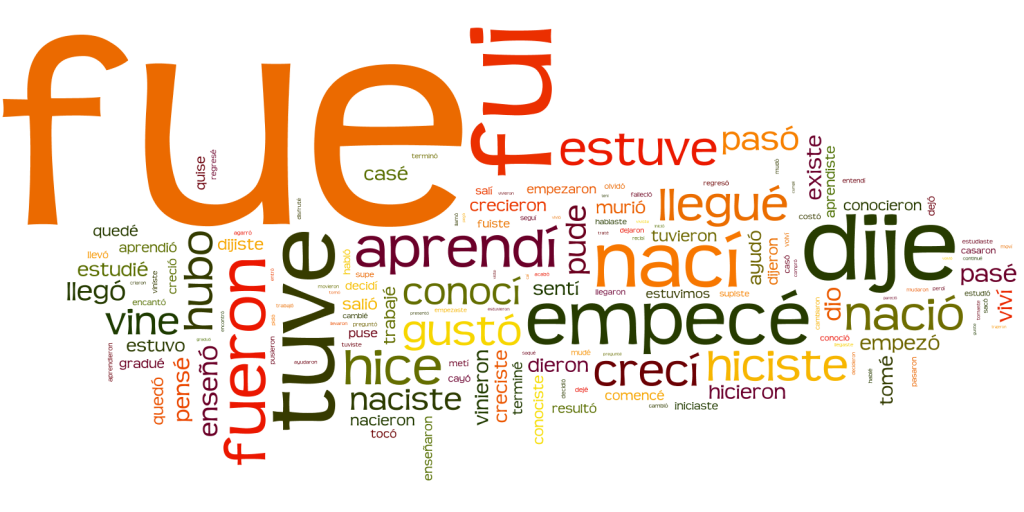The preterit (pretérito) is one of the two simple past tenses in Spanish. It is used for completed actions in the past. One of challenging aspect of the preterit tense is its larger number of irregular conjugations.
Conjugation
We can divide conjugations into 4 categories: regulars, stem changers, spelling changers, and strong preterits.
Regular Endings
Regular -ar verbs:
| hablar to speak | |
|---|---|
| yo hablé | nosotros/as hablamos |
| tú hablaste | |
| él/ella/usted habló | ellos/as/ustedes hablaron |
Regular -er and -ir verbs:
| comer to eat | |
|---|---|
| yo comí | nosotros/as comimos |
| tú comiste | |
| él/ella/usted comió | ellos/as/ustedes comieron |
And after 15 years I brought them back to a family reunion in the Andes.
Stem Changers
There are three rules to know about stem changing in the preterit tense.
- Only -ir verbs stem change; -ar and -er present tense stem changers maintain their original stem in the preterit
acostar: acosté, acostaste, acostó, acostamos, acostaron
- Only the third person singular and plural stem change (el/ella/usted and ellos/ellas/ustedes)
pedir: pedí, pediste, pidió, pedimos, pidieron
- Stem changers go from e to i, or from o to u,regardless of their vowel change in present tense
dormir: dormí, dormiste, durmió, dormimos, durmieron
Todos los días para mí son bonitos, inclusive cuando murió mi papá y murió mi mamá yo sentía felicidad porque ya estaban con Dios.Every day for me is beautiful, even when my dad died and my mom died, I felt happiness because I knew they were with God.
Spelling Changers
Some verbs change their spelling in the yo form to maintain their sound: –CAR, –GAR, -ZAR
In the yo form,
- -car verbs: c –> qu
tocar, yo toqué
- -gar verbs: g –> gu
jugar, yo jugué
- -zar verbs: z –> c
Yo comencé prácticamente de cero.comenzar, yo comencé
I started practically from zero.
Strong Preterits
Completely irregular verbs in the preterit are also called strong preterits. They can be grouped by the letters they use to aid in memorization.
| I Group | V Group |
|---|---|
|
|
| J Group | U Group |
|
|
Others:
- Ser: fui, fuiste, fue, fuimos, fueron
- Ir: fui, fuiste, fue, fuimos, fueron
- Dar: di, diste, dio, dimos, dieron
- Ver: vi, viste, vio, vimos, vieron
September 16th was a great celebration in Mexico because it is Independence Day. Me dijeron que tenía que acabar high school.
They told me that I had to finish high school.
For more information about the uses of the preterit and comparisons with the imperfect see also the page about narration.
Some Spanish speakers add an –s to the tú form in the preterite, as seen in the example below. Although this form of tú is not considered correct according to traditional grammars, it is found across Latin America and is seen as a hypercorrection as tú forms in all other tenses end in –s (ex. caminar: caminas, caminabas, caminarás, caminarías, etc.).
Hemos ido a Sudamérica, a Argentina a tirar palomas. Era horrible que cuantos matamos. Tenían un club si matastes mil palomas te pusieron en en la tabla en el comedor. We’ve gone to South America, to Argentina, to shoot pigeons. It was horrible how many we killed. They had a club, if you killed a thousand pigeons they put you on the board in the dining hall.
